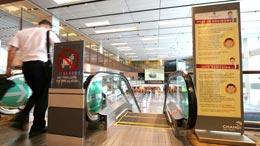Low risk of global spread of virus: WHO

Asian nations are using thermal-imaging cameras and posting doctors at airports to screen out sick travellers as health authorities scramble to avert any outbreak of the Ebola virus that has killed almost 1,000 people in West Africa.
Meanwhile, The Philippines has stopped sending Filipino workers to Sierra Leone, Guinea and Liberia, where the deadly Ebola virus is quickly spreading.
Fiipino Health Secretary Enrique Ona said the temporary ban is being implemented, as health officials remain on "heightened alert" for symptoms of Ebola among travellers from the three West African states.
Ona said five of 15 Filipinos who recently arrived from Sierra Leone are still under observation. The rest tested negative and had been released, he said.
The foreign ministry's spokesman Charles Jose also said that there has so far been no reports of Ebola infection among some 3,700 Filipinos in Sierra Leone, Guinea and Liberia.
The four nations of Guinea, Liberia, Nigeria and Sierra Leone are struggling to combat the world's worst outbreak of Ebola, which has a fatality rate of up to 90 per cent, with no known vaccine or cure.
The World Health Organisation has declared the West Africa epidemic an "extraordinary event" and an international public health emergency.
There have been no confirmed cases of the virus in Asia, but health authorities who have battled deadly viruses, such as bird flu and the Severe Acute Respiratory Syndrome (SARS) in recent years, were dusting off the drills used for those outbreaks.
In Singapore, nationals of Guinea, Liberia, Sierra Leone and Nigeria - where most cases have occurred - will be issued individual health advisories when they come through Singapore's immigration checkpoints, said the Ministry of Health (MOH).
All major entry points in Malaysia, including the Kuala Lumpur International Airport (KLIA), are under an Ebola virus alert as the World Health Organisation (WHO) scrambles to contain the outbreak in West Africa.
Clear instructions have been given to officers at the entry points on what to do to prevent transmissions from travellers, the government said.
Taiwan this week went on alert as Hong Kong news media has reported a suspected case of the deadly Ebola virus, the Centers for Disease Control (CDC) said.
The 32-year-old Nigerian man, who arrived in Hong Kong from Nigeria Aug. 7, was hospitalized with vomiting and diarrhea and has since been quarantined at a different hospital on suspicion of infection with the Ebola virus, according to the news report.
India is also on the alert for the Ebola virus, said Health Minister Harsh Vardhan, suggesting there is a risk the deadly virus could be imported into the country if the large population of Indians working in the four affected West African nations returns.
There are nearly 45,000 Indian nationals living and working in Guinea, Liberia, Sierra Leone and Nigeria
"If the situation worsens in the affected countries, there could be a possibility of these Indians travelling back to India," Vardhan said. "While the risk of Ebola virus cases in India is low, preparedness measures are in place to deal with any case of the virus imported to India."
Of the 4,700 Indians in Guinea, Liberia and Sierra Leone, 300 are Central Reserve Police Force personnel - comprising largely women - serving as UN peacekeepers in Liberia. Nigeria has nearly 40,000 Indian citizens.
There are also 7,000 Indian troops deployed in other African nations, but not in the affected countries.
Asia's efforts to screen visitors were adequate, said Tarik Jasarevic, a WHO spokesman based in Geneva.
"As long as a person is not visibly sick we think it's fine for them to be in public," he was quoted as saying. "We consider the risk for international spread quite low. The measures countries in Asia have taken are appropriate."
The Ebola virus is only transmitted through contact with the bodily fluids of someone with symptoms, which initially include muscle pains and joint aches, then worsen to vomiting, diarrhoea and internal and external bleeding in the final stages.
In China, there were no reports of Ebola cases but hospitals have been told to report any suspected cases. Japan is ready to send suspected Ebola victims to special isolation hospitals, Chief Cabinet Secretary Yoshihide Suga told a news conference.
In Australia, authorities said they had not taken extra steps but airports were on alert for sick travellers, saying the risk of the disease reaching the country was "very low."









